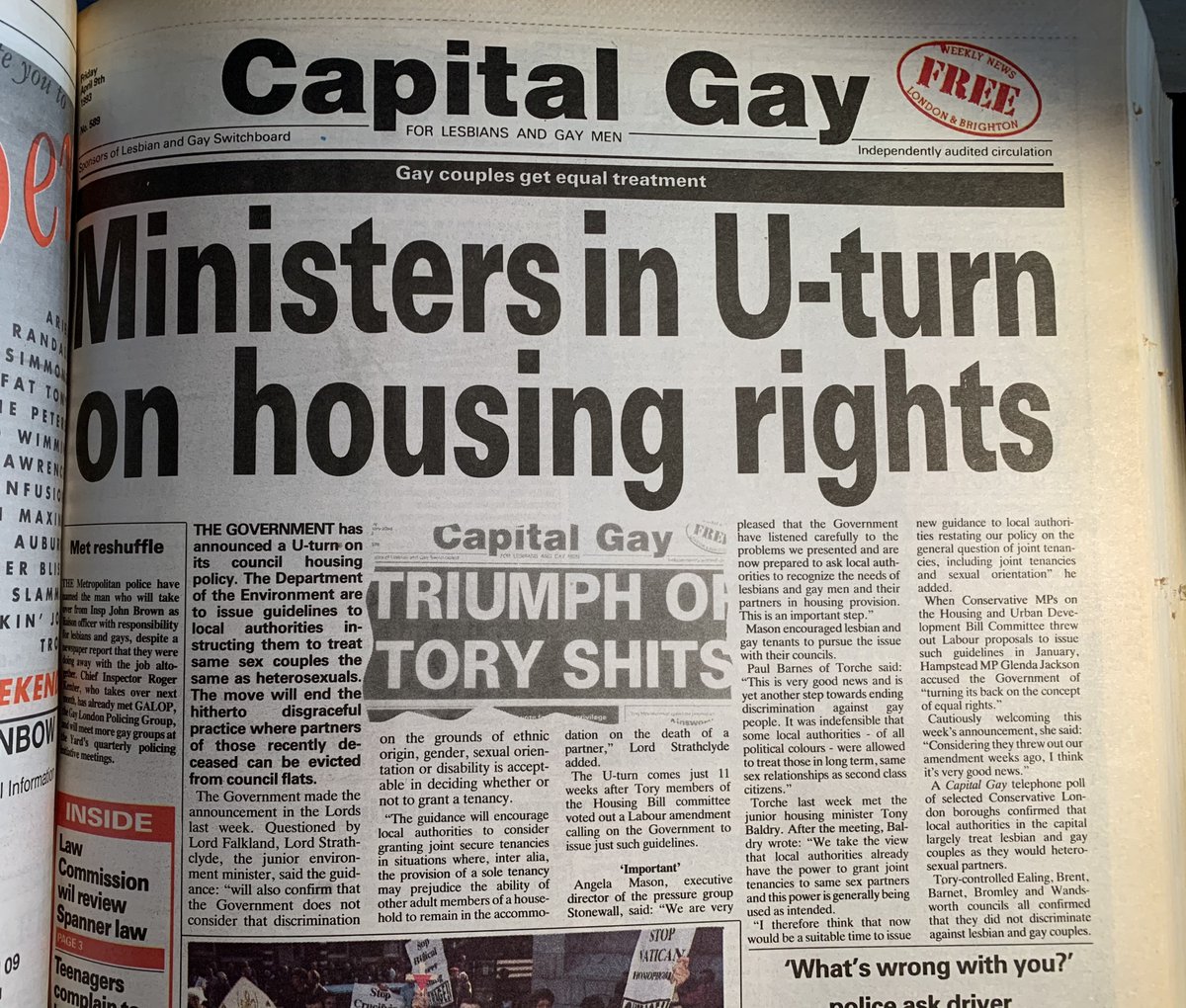This week I contributed to a documentary about a gay murder in the early 90s. To prepare, I looked through the Capital Gay archive of 1993. It made grim reading. This thread may be useful next time we're told that using the 'wrong' pronoun is the same as homophobia in the 90s.
JANUARY. Obituaries took up a lot of space in gay newspapers – both in editorial and the small ads. One of these is a world celebrity; everyone else is a gay Londoner. Aside from Nureyev, the ages of the deceased (where provided) are 45, 34 and 33. 



FEBRUARY. Police thwart a queer*bashing spree on Hampstead Heath, arresting four men armed with baseball bats, CS gas canisters and snooker cues.
*The violent attackers were looking to attack, maim and even murder gay men, not married heterosexual oppression tourists.
*The violent attackers were looking to attack, maim and even murder gay men, not married heterosexual oppression tourists.

MARCH. Figures reveal that 58 gay men and 46 lesbians were discharged from the armed forces in 1991 for being homosexual*. @anyabike, then of Stonewall, says the official figures are just the tip of the iceberg.
*Not for being LGBT+. Being asexual in the armed forces was fine.
*Not for being LGBT+. Being asexual in the armed forces was fine.

APRIL. Some good news: John Major's government agrees to issue guidelines to prevent local authorities evicting the same-sex partners of recently deceased people from council flats. Just 11 weeks earlier, a Housing Bill committee refused to back this reform. 

MAY. Tear gas is sprayed at customers inside a gay pub in Brighton. Police say they're hearing of more and more incidents of this nature.
(The report is written by the late lamented @Fagburn)
(The report is written by the late lamented @Fagburn)

JUNE. SERIAL KILLER STALKS LONDON. The police reveal that five men have been killed in their beds in exactly the same way and they believe the same killer is responsible. They know this, we later learn, because the killer called 999 to complain that no one was looking for him. 

JULY. More on that murder hunt. We were pretty angry. 'Police believe the same man made six phone calls to various London police stations, but those calls dried up on June 15th, the day the call was made telling police about a fifth victim...' 

AUGUST. A debate on lowering the age of consent for gay men (gay sex is currently illegal for under-21s) is banned from Westminster Hall, a stone's thrown from Parliament, because one side of the motion contravenes religious teachings on morality. 

SEPTEMBER. A rise in homophobic attacks in South London is linked to the popularity of the Buju Banton song Boom Bye-Bye, whose lyrics incite the murder of gay men.
(The Guardian later publishes an op ed saying the gays complaining about this song are racist.)
(The Guardian later publishes an op ed saying the gays complaining about this song are racist.)

OCTOBER. Police pay £10k to a 28-year-old man who was arrested for gross indecency and then beaten up in custody. His real offence was to use a public toilet (for its actual purpose) while gay 

NOVEMBER. We ran a short item like this every month. Nearly 21,000 people in the UK had now been diagnosed with HIV, of whom just over 8,000 had progressed to Aids and 5,153 had died. The overwhelming majority were gay men. The majority were probably also our readers. 

DECEMBER. In our Xmas issue, we can report the jailing of serial killer Colin Ireland for life, never to be released. My personal view from the Old Bailey is at the bottom of the page. NB also on the same page the creator of The Archers slamming plans to introduce gay characters. 



Also DECEMBER. A man who admitted stabbing Duncan Bone five times while he was tied up in his own bed and then setting fire to his body gets 14 years for manslaughter after the jury fails to reach a verdict on the murder charge. By the standards of the day, this was a good result 

That last one was the case I was commenting on for the film crew this week. There you have it: 1993, month by month. Of course we also reported good news, because we were a local paper and a notice board for the community. We tried to amplify happiness wherever we found it.
NB there's no mention in this digest of Section 28, a nasty law which was never actually used in a prosecution and was a fairly low-level problem back then, what with everything else we faced. Remember that when people who weren't there talk about 'the era of Section 28'.
And do feel free to quote from this review of gay life in the early 90s next time a self-appointed expert on the history of the period tells you that the present, long-overdue debate on the role of Stonewall in the public realm is 'just like the homophobia of the 80s and 90s'.
• • •
Missing some Tweet in this thread? You can try to
force a refresh






